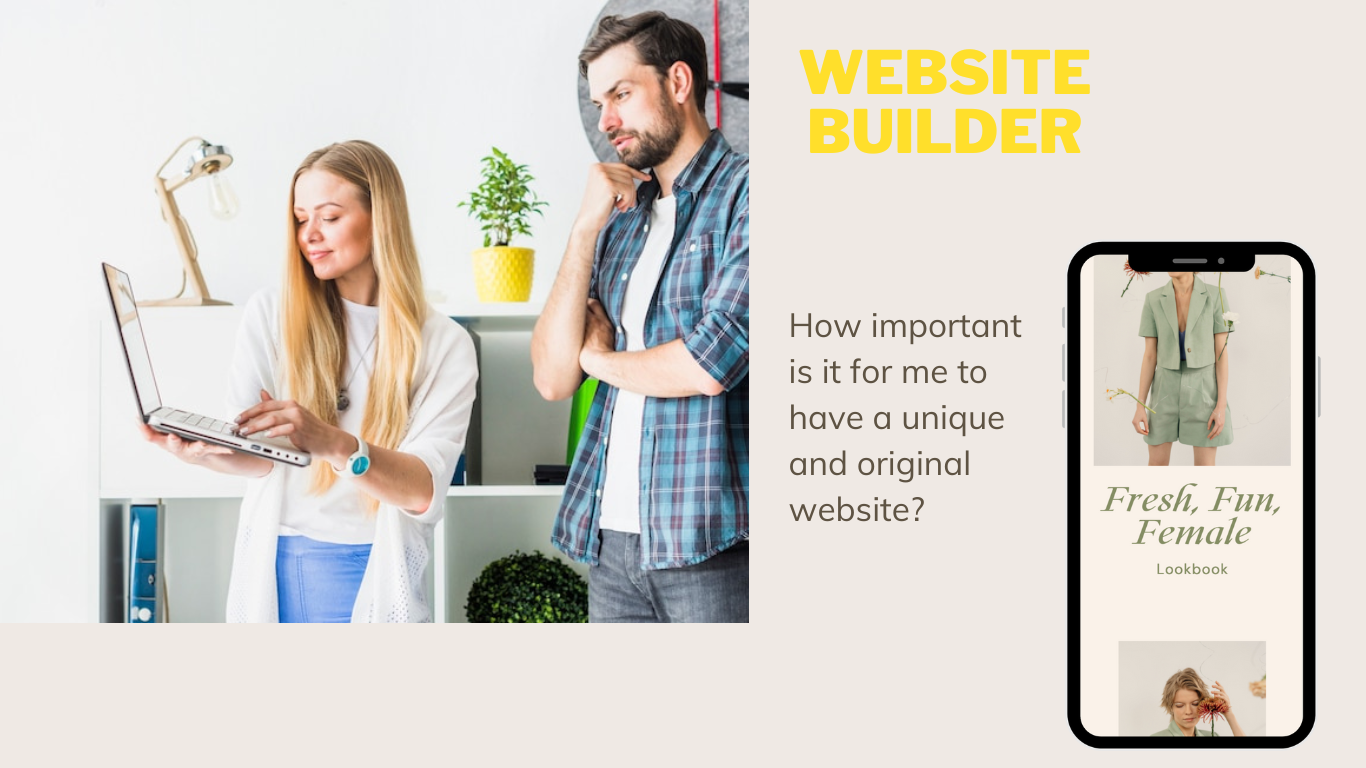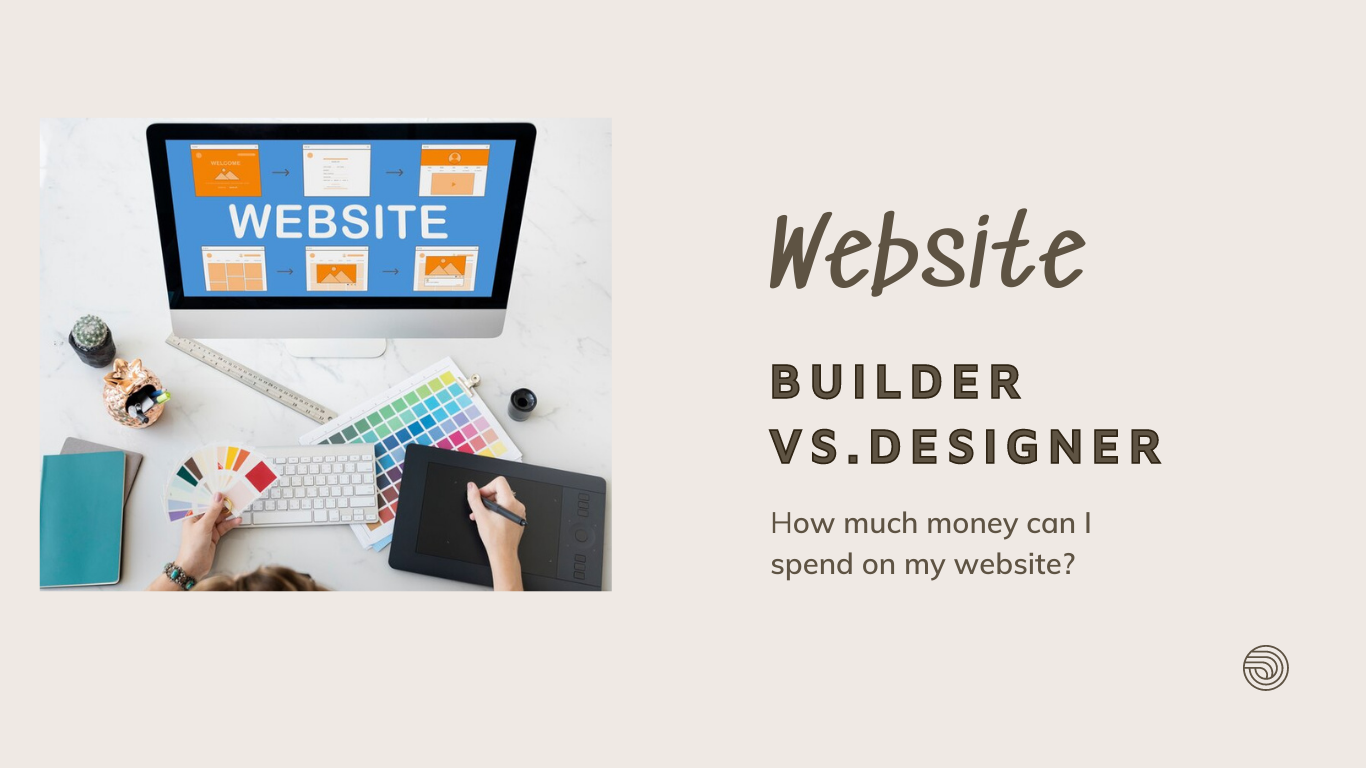You want to create a website for your business, you have two main options: use a website builder or hire a web designer. Both options have their advantages and disadvantages, and the best choice depends on your specific needs and preferences. In this article, we will compare website builders and web designers in terms of four factors: budget, design and features, coding knowledge, and timeframe. By the end of this article, you should have a better idea of which option is best for your business.
Website Builder
If you want to create a website quickly and easily, a website builder might be the best option for you. A website builder is a software tool that allows you to build a website without writing any code or having any technical skills. You can choose from a variety of pre-designed templates and customize them with your own content, images, colors, fonts, and features. You can also use drag-and-drop tools and intuitive interfaces to arrange the layout and design of your website.
See more: https://webfity.com/blog/what-is-a-website-builder
Best for small budgets and simple websites
One of the main advantages of using a website builder is that it is very affordable and cost-effective. You can usually get started with a free plan or a low monthly fee that includes hosting, domain name, security, and support. You can also save money on hiring a web designer or developer, as you can do everything yourself with the help of the website builder.
Another benefit of using a website builder is that it is ideal for creating simple websites that do not require complex functionality or customization. You can use a website builder to create a basic informational website, a personal blog, a portfolio, a landing page, or a small online store. You can also add some features such as contact forms, social media integration, newsletters, or e-commerce tools with the help of plugins or widgets.
Offers pre-designed templates and user-friendly interfaces
A website builder makes it easy for anyone to create a website without any prior knowledge or experience. You can choose from hundreds or thousands of pre-designed templates that suit your niche, industry, style, and purpose. You can also preview and test different templates before selecting the one that best fits your needs.

A website builder also provides you with user-friendly interfaces that guide you through the process of building your website. You can use drag-and-drop tools to move elements around your page, resize them, align them, and edit them. You can also use menus and buttons to change the colors, fonts, backgrounds, and other aspects of your website. You can also access tutorials, tips, and help sections if you need any assistance.
Requires no coding or technical skills
A website builder eliminates the need for any coding or technical skills to create a website. You do not need to know HTML, CSS, JavaScript, PHP, or any other programming language to build your website. You also do not need to worry about hosting, domain name registration, security certificates, backups, updates, or maintenance. The website builder takes care of all these aspects for you.
Limited customization options
One of the main drawbacks of using a website builder is that it limits your customization options. You can only choose from the templates and features that the website builder offers. You cannot modify the code or add custom functionality to your website. You also have to follow the rules and restrictions of the website builder platform.
Another disadvantage of using a website builder is that it may result in a generic or cookie-cutter website that looks similar to many other websites on the web. You may not be able to express your unique brand identity or personality through your website. You may also face issues with compatibility, performance, SEO (search engine optimization), or accessibility.
Less flexibility and scalability
A website builder may not be suitable for creating complex or custom websites that have unique requirements or goals. You may not be able to add advanced features such as databases, forums, membership systems, booking systems, payment gateways, or custom integrations. You may also face difficulties in changing or migrating your website if you want to switch platforms or providers.

A website builder may also not be able to handle high traffic volumes or large-scale growth. You may encounter problems with loading speed, security breaches, downtime, or data loss. You may also have to pay more for upgrading your plan or adding more resources.
Suitable for basic informational websites or small online stores
A website builder is best suited for creating basic informational websites or small online stores that do not require much customization or functionality. A website builder can help you create a professional-looking and functional website in a short time and with minimal effort and cost. A website builder can also help you establish an online presence and reach more customers.
Web Designer
If you want to create a complex or custom website with unique requirements or goals, a web designer might be the best option for you. A web designer is a professional who creates websites using various skills and tools such as graphic design, user interface design,
content creation, coding, testing, and optimization. A web designer can provide you with expert advice and tailored solutions for your specific needs and preferences.
Best for complex or custom websites with unique requirements
One of the main advantages of hiring a web designer is that they can create complex or custom websites that meet your unique requirements or goals. A web designer can design and develop your website from scratch according to your specifications and vision. They can also add custom functionality and features that are not available in standard templates or plugins.
Another benefit of hiring a web designer is that they can provide you with professional expertise and guidance throughout the process of creating your website. They can help you define your target audience,
brand identity,
value proposition,
and online strategy.
They can also help you optimize your website for SEO,
performance,
usability,
accessibility,
and conversion.

Provides professional expertise and tailored design
A web designer can provide you with professional expertise and tailored design for your website. They can use their knowledge and experience in graphic design,
user interface design,
content creation,
coding,
testing,
and optimization to create a website that suits your niche,
industry,
style,
and purpose.
They can also use their creativity and innovation to create a unique and original design that reflects your brand personality and values.
A web designer can also provide you with feedback and suggestions on how to improve your website. They can conduct research,
analysis,
and testing to identify the strengths and weaknesses of your website.
They can also monitor and measure the performance and results of your website using various tools and metrics.
Offers extensive customization and flexibility
A web designer can offer you extensive customization and flexibility for your website. They can modify the code and add custom functionality to your website according to your needs and preferences.
They can also integrate your website with various external services and platforms such as social media,
email marketing,
analytics,
CRM (customer relationship management),
or e-commerce.
They can also make changes or updates to your website as needed.
Requires a higher budget
One of the main drawbacks of hiring a web designer is that it requires a higher budget than using a website builder.
You have to pay for the services of the web designer,
which may vary depending on their skills,
experience,
reputation,
and scope of work.
You may also have to pay for other expenses such as hosting,
domain name,
security certificates,
backups,
updates,
or maintenance.
You may also have to pay more if you want to make changes or additions to your website in the future.
Takes more time to develop and maintain
Another disadvantage of hiring a web designer is that it takes more time to develop and maintain your website than using a website builder.
You have to communicate with the web designer regularly throughout the process of creating your website.
You have to provide them with clear instructions,
feedback,
and approval at each stage.
You may also have to wait for them to complete their work before launching your website.
You may also have to rely on them for making changes or updates to your website in the future.
Suitable for businesses seeking a unique online presence or advanced functionality
A web designer is best suited for creating complex or custom websites that have unique requirements or goals.
A web designer can help you create a unique online presence that stands out from the competition.
They can also help you create advanced functionality that enhances the user experience and increases conversions.
A web designer can also help you achieve long-term success and growth for your business online.
